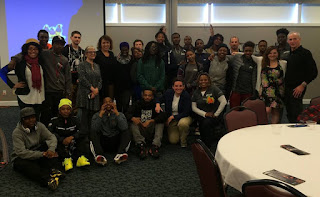Let's talk about privilege.
I was getting ready to attend a peaceful march to support Black Lives Matter and honor the memories of George Floyd, Breonna Taylor, and Ahmaud Arbery. Like so many times where I have wanted to participate in group activism, my mental health disorder left me anxiety-stricken and unable to calm myself enough to attend. I felt a deep guilt. I reached out to my disability community on The Mighty to brainstorm ways to support the cause, and I realized that if we can do nothing else, we can take time to study systemic racism through the perspective of historically marginalized people.
As a social work student, I have spent a lot of time (and money) studying social justice and human rights. I thank Fordham University for facilitating uncomfortable, but necessary, conversations about privilege and power. We cannot begin to unpack injustice without reflecting on our own privilege and perspectives. My privilege as a white, middle class, heterosexual cis-woman has given me easier access to resources than minorities. It is an unfortunate reality and deeply-rooted in society. Our history books, curriculum, and the vast majority of early popular culture were written and told through the lens of people who had the most privilege and held the most power.
What we are witnessing in society with police brutality and violent racism is disturbing. Understanding privilege is acknowledging that most of us are just “witnessing.” I will never know the fear and prejudice Black men and women experience on a daily basis. Knowing that privilege shapes our perception of social justice is the first stepping in unlearning the biased history we had accepted as truth.
It’s far past time for us all to stand up to the injustice faced by our country’s Black community. If you can walk, then walk. If you can donate, then donate. If you can call legislators, then call. Whatever you choose to do, make sure you read, watch, and think. Don’t limit yourself by only social media scrolling. Read memoirs of racial justice leaders, written accounts of Black individuals falsely imprisoned, books written during segregation, and major works or current articles written by Black individuals. Watch films by Black writers and directors and documentaries with real video footage and interviews with Black individuals who can provide a first-hand account of significant historical events. Think about intersectionality, how other factors like disability, language barriers, poverty, sexual orientation, gender, and religion affect Black persons today and historically. Activism is important, but understanding the full context of the issues is essential.
I am not perfect and I have made my own mistakes in believing stereotypes and using microaggressions. I have a lot to learn about Black culture and the Black experience, and I am challenging myself to read or watch a piece by a Black person each day. While I commend the Black community for explaining their culture, traditions, and experiences, it is not their job to teach tolerance. As a country, we need to step-up, self-reflect, and read a book. Lasting change cannot happen without knowledge, empathy, and humility.

Comments
Post a Comment